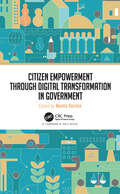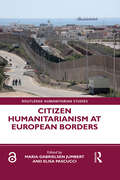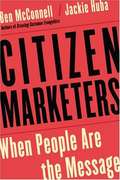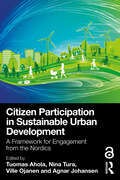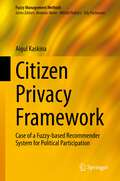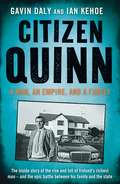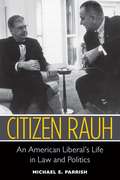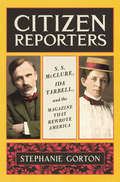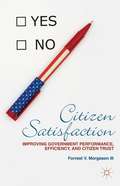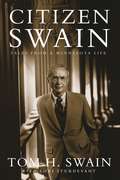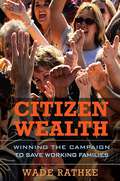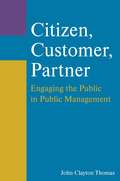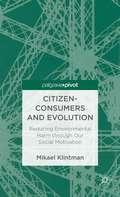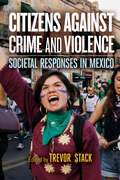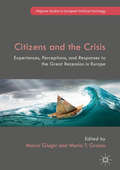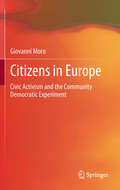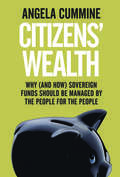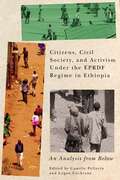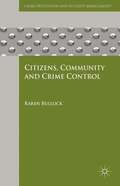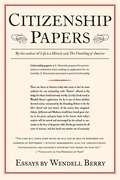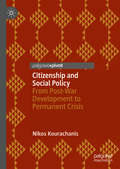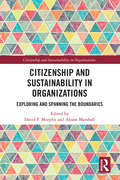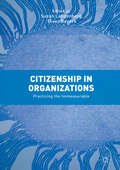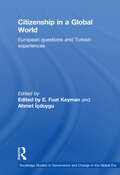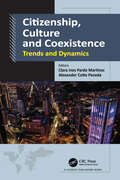- Table View
- List View
Citizen Empowerment through Digital Transformation in Government
by Neeta VermaTechnological innovations across the globe are bringing profound change to our society. Governments around the world are experiencing and embracing this technology-led shift. New platforms, emerging technologies, customizable products, and changing citizen demand and outlook towards government services are reshaping the whole journey. When it comes to the application of Information and Communication Technologies (ICT) in any sector, the Government of India has emerged as an early adopter of these technologies and has also focused on last-mile delivery of citizen-centric services. Citizen Empowerment through Digital Transformation in Government takes us through the four-decade long transformational journey of various key sectors in India where ICT has played a major role in reimagining government services to citizens across the country. It touches upon the emergence of the National Informatics Centre as a premier technology institution of the Government of India and its collaborative efforts with the Central, State Governments, as well as the District level administration, to deliver best-in-class solutions. Inspiring and informative, the book is filled with real-life transformation stories that have helped to lead the people and the Government of India to realize their vision of a digitally empowered nation.
Citizen Humanitarianism at European Borders (Routledge Humanitarian Studies)
by Maria Gabrielsen JumbertAt a time of escalating conflict between states and NGOs engaged in migrant search and rescue operations across the Mediterranean, this book explores the emerging trend of citizen-led forms of helping others at the borders of Europe. In recent years, Europe’s borders have become new sites of intervention for traditional humanitarian actors and governmental agencies, but also, increasingly, for volunteer and activist initiatives led by "ordinary" citizens. This book sets out to interrogate the shifting relationship between humanitarianism, the securitization of border and migration regimes, and citizenship. Critically examining the "do it yourself" character of refugee aid practices performed by non-professionals coming together to help in informal and spontaneous manners, the volume considers the extent to which these new humanitarian practices challenge established conceptualisations of membership, belonging, and active citizenship. Drawing on case studies from countries around Europe including Greece, Turkey, Italy, France and Russia, this collection constitutes an innovative and theoretically engaged attempt to bring the field of humanitarian studies into dialogue with studies of grassroots refugee aid and, more explicitly, with political forms of solidarity with migrants and refugees which fall between aid and activism. This book is key reading for advanced students and researchers of humanitarian aid, European migration and refugees, and citizen-led activism.
Citizen Marketers: When People Are the Message
by Ben Mcconnell Jackie HubaCitizen marketers: Who are they? What motivates them? Marketing experts Ben McConnell and Jackie Huba explore the ramifications of social media in Citizen Marketers. As everyday people increasingly create content on behalf of companies, brands or products, they are collaborating with others just like themselves and forming ever-growing communities of enthusiasts and evangelists. From the rough to the sophisticated, the ""user-generated media"" of blogs, online bulletin boards, podcasts, photos, songs, and animations are influencing companies' customer relationships, product design, and marketing campaigns, whether they participate willingly or not.
Citizen Participation in Sustainable Urban Development: A Framework for Engagement from the Nordics
by Agnar Johansen Tuomas Ahola Nina Tura Ville OjanenThis book assesses the ambitious goals for sustainability set by cities and nations and details ways to achieve those goals through effective forms of collaboration between citizens and multiple stakeholders, such as municipal decision-makers, entrepreneurs, and academic researchers.Each chapter discusses how citizens are currently involved in urban development and what opportunities there are for further deepening the collaboration in the context of urban development between citizens and municipalities. Cases from the Nordics focus on the adoption and use of digital technologies in the provision of municipal services as well as in citizen participation. The book presents the state of the art in scientific research in the field, practical examples from multiple case studies of sustainable urban development initiatives, as well as key themes for moving the discourse forward in the future. It is essential for academics, students, researchers, policymakers, urban planners, and professionals working in the areas of sustainability, urban development, and citizen engagement. It will also be relevant to citizen groups, community organisations, and activists who are interested in advocating for and participating in the development of smart and sustainable cities, particularly in Nordic countries.The Open Access version of this book, available at www.taylorfrancis.com, has been made available under a Creative Commons Attribution (CC-BY) 4.0 license.
Citizen Privacy Framework: Case of a Fuzzy-based Recommender System for Political Participation (Fuzzy Management Methods)
by Aigul KaskinaThis book presents the concept of a fuzzy-based recommender system for user account privacy settings that can be used for citizen participation on online political platforms. The elaborated components are exemplarily based on the needs of a political platform implemented during the presidential election in Ecuador. The book readdresses the issue of privacy paradox demonstrating that, indeed, users’ actual decisions of being private in most cases diverge with their initial privacy intentions. The two concepts presented in the book - the citizen privacy profile framework and the prototype fuzzy-based privacy settings recommender system - can be adapted by different organizations such as government institutions, NGOs, or private online service providers to meet their specific needs. The book will be of interest to researchers and practitioners in the areas of usage modeling, privacy, system design, and for service providers in eDemocracy.
Citizen Quinn
by Ian Kehoe Gavin DalyCitizen Quinn tells the staggering story of the rise and fall of Ireland's richest man: Sean Quinn. A few years ago, Sean Quinn was ranked among the two hundred richest people in the world, with a personal fortune of some $6 billion. Today he is bust, and his businesses have been taken from him. How did it all happen? In Citizen Quinn, Ian Kehoe and Gavin Daly trace the remarkable life of the 'simple farmer's son' who made most of his money through guts and graft long before the excesses of the Celtic Tiger, who brought economic vibrancy to a depressed border region, and who then lost it all through a disastrous move into the insurance business and a multi-billion-euro gamble on the shares of the world's most toxic bank. 'Gripping and well-researched ... paints a picture of a man who is delusional about what has happened and the extent to which he is to blame' Irish Times'For all those intrigued by by a small Cavan farmer's son came to be one of the richest men in the world, and then lost it all, Citizen Quinn is a must-read' Sunday Business Post 'The book chronicles this truly compelling story, and the story of a compelling man' Irish Mail on Sunday 'A gripping story told in language that people without an MBA can follow' Irish Independent'A great read' Sean O'Rourke, RTE Radio One
Citizen Rauh: An American Liberal's Life in Law and Politics
by Michael E. ParrishNo lawyer in the post-1945 era did more to protect the economic interests of working-class Americans than Rauh, who fought for the unions as they struggled for legitimacy and against them when they betrayed their own members. No lawyer stood more courageously against repressive anticommunism during the 1950s or advanced the cause of racial justice more vigorously in the 1960s and 1970s. No lawyer did more to defend the constitutional vision of the Warren Court and resist the efforts of Richard Nixon and Ronald Reagan to undo its legacy. Throughout his life, Rauh continued to articulate a progressive vision of law and politics, ever confident that his brand of liberalism would become vital once again when the cycle of American politics took another turn.
Citizen Reporters: S.S. McClure, Ida Tarbell, and the Magazine That Rewrote America
by Stephanie GortonA fascinating history of the rise and fall of influential Gilded Age magazine McClure’s and the two unlikely outsiders at its helm—as well as a timely, full-throated defense of investigative journalism in AmericaThe president of the United States made headlines around the world when he publicly attacked the press, denouncing reporters who threatened his reputation as “muckrakers” and “forces for evil.” The year was 1906, the president was Theodore Roosevelt—and the publication that provoked his fury was McClure’s magazine.One of the most influential magazines in American history, McClure’s drew over 400,000 readers and published the groundbreaking stories that defined the Gilded Age, including the investigation of Standard Oil that toppled the Rockefeller monopoly. Driving this revolutionary publication were two improbable newcomers united by single-minded ambition. S. S. McClure was an Irish immigrant, who, despite bouts of mania, overthrew his impoverished upbringing and bent the New York media world to his will. His steadying hand and star reporter was Ida Tarbell, a woman who defied gender expectations and became a notoriously fearless journalist.The scrappy, bold McClure's group—Tarbell, McClure, and their reporters Ray Stannard Baker and Lincoln Steffens—cemented investigative journalism’s crucial role in democracy. From reporting on labor unrest and lynching, to their exposés of municipal corruption, their reporting brought their readers face to face with a nation mired in dysfunction. They also introduced Americans to the voices of Willa Cather, Arthur Conan Doyle, Robert Louis Stevenson, Joseph Conrad, and many others.Tracing McClure’s from its meteoric rise to its spectacularly swift and dramatic combustion, Citizen Reporters is a thrillingly told, deeply researched biography of a powerhouse magazine that forever changed American life. It’s also a timely case study that demonstrates the crucial importance of journalists who are unafraid to speak truth to power.
Citizen Satisfaction
by Forrest V. Morgeson IIICitizen Satisfaction investigates the topic of satisfaction with government services from a variety of perspectives, using case studies and empirical results from satisfaction studies at the federal level.
Citizen Swain: Tales from a Minnesota Life
by Tom H. SwainAn entertaining personal history of the state, told by one of its leading citizens For an insider&’s take on the last eighty years in Minnesota history, sit down with Tom H. Swain&’s memoir. It is a personal look at the people and events that shaped the state&’s history, written by a civic and business leader—and a true public servant—with a genuine knack for telling a story. From business to athletics, politics to education, Swain is a key player. He&’s been a mayor, a University of Minnesota vice president, a chief of staff to former Minnesota governor Elmer L. Andersen, and a member and chair of numerous nonprofit and civic boards. In Citizen Swain: Tales from a Minnesota Life, he brings his vibrant presence and meaningful contributions to life eloquently, giving readers a rare glimpse into the inner workings of institutions and their leaders.Swain was more than a witness to state history. He helped make it happen. Readers learn what it was like to be a part of Governor Andersen&’s administration—including details about the dramatic vote recount that ended his term. Swain&’s dedication to education and sports shine through as he speaks of his service at the University of Minnesota. Over the years in positions ranging from ticket manager in the athletic department to vice president, Swain got to know Gopher coach Bernie Bierman and three University of Minnesota presidents—Nils Hasselmo, Mark Yudof, and Robert Bruininks. Twenty-three years at the St. Paul Companies gave him profound insight into the state&’s oldest corporation.Whether he&’s describing the hard work behind the scenes of the massive civic celebration of the state&’s centennial or growing up in 1930s and 1940s Minneapolis, Swain&’s passion for making Minnesota a better place comes through in these remembrances, told with warmth, respect, and not a small amount of wit. Citizen Swain will be an inspiration to anyone seeking to make positive change through active citizenship.
Citizen Wealth: Winning the Campaign to Save Working Families
by Wade RathkeAmerica’s safety net is torn and tattered. Income inequality continues to grow—the gap between rich and poor has expanded fivefold in the last 25 years. For millions of working families achieving basic middle class comforts has begun to seem as distant a dream as winning the lottery. What is needed, and what veteran organizer and ACORN founder Wade Rathke provides in this hard-hitting new book, is a comprehensive grassroots strategy to create what he calls citizen wealth: an enduring foundation on which working people can build a future that extends beyond paying next month’s rent.Rathke shares breakthrough strategies that have enabled ACORN and other organizations help people secure the basics of citizen wealth—a house and a decent income—offering from-the-trenches advice on mounting successful living wage campaigns, battling unscrupulous and predatory lending practices, and developing new forms of worker organizations to protect wages and benefits. The anti-poverty programs still out there can provide critical support for citizen wealth-building efforts, but they’re woefully underutilized. Rathke shows how to cut through government indifference and bureaucratic obstacles to provide those in need with access to these vital resources. But community organizations can’t do it alone. Rathke describes ACORN partnerships with HSBC Bank and H & R Block that helped these businesses see building citizen wealth as a new market opportunity—a win for them and for the people they once exploited. And he looks at other examples of strange bedfellows in the fight for citizen wealth, including Citibank, once the target of massive protests by ACORN and now, working with them, a major investor in working class communities.“We need to create a national economic and political consensus that increasing family income, wealth and assets is not `welfare’ or an entitlement ‘give-away” program but an investment in the public good and well-being.” Rathke writes. Based on forty years of hard-won experience, Wade Rathke offers a new blueprint for helping millions to achieve the American Dream.
Citizen, Customer, Partner: Engaging the Public in Public Management
by John Clayton ThomasFor almost a half a century, scholars and practitioners have debated what the connections should be between public administration and the public. Does the public serve principally as citizen-owners, those to whom administrators are responsible? Are members of the public more appropriately viewed as the customers of government? Or, in an increasingly networked world, do they serve more as the partners of public administrators in the production of public services? This book starts from the premise that the public comes to government not principally in one role but in all three roles, as citizens and customers and partners. The purpose of the book is to address the dual challenge that reality implies: (1) to help public administrators and other public officials to understand the complex nature of the public they face, and (2) to provide recommendations for how public administrators can most effectively interact with the public in the different roles. Using this comprehensive perspective, Citizen, Customer, Partner helps students, practitioners, and scholars understand when and how the public should be integrated into the practice of public administration. Most chapters in Citizen, Customer, Partner include multiple boxed cases that illustrate the chapter’s content with real-world examples. The book concludes with an extremely useful Appendix that collects and summarizes the 40 Design Principles – specific advice for public organizations on working with the public as customers, partners, and citizens.
Citizen-Consumers and Evolution: Reducing Environmental Harm through Our Social Motivation
by Mikael KlintmanThis book develops a groundbreaking, novel approach to examining ethical consumer behaviour from the perspective of evolutionary theory, illustrating the deeply rooted potentials and limits within society for reducing environmental harm.
Citizens against Crime and Violence: Societal Responses in Mexico
by Sasha Jesperson Trevor Stack Pilar Domingo Irene Álvarez Denisse Román Edgar Guerra Ariadna Sánchez Iran Guerrero Salvador Maldonado Catherine WhittakerMexico has become notorious for crime-related violence, and the efforts of governments and national and international NGOs to counter this violence have proven largely futile. Citizens against Crime and Violence studies societal responses to crime and violence within one of Mexico’s most affected regions, the state of Michoacán. Based on comparative ethnography conducted over twelve months by a team of anthropologists and sociologists across six localities of Michoacán, ranging from the most rural to the most urban, the contributors consider five varieties of societal responses: local citizen security councils that define security and attempt to influence its policing, including by self-defense groups; cultural activists looking to create safe 'cultural' fields from which to transform their social environment; organizations in the state capital that combine legal and political strategies against less visible violence (forced disappearance, gender violence, anti-LGBT); church-linked initiatives bringing to bear the church’s institutionality, including to denounce 'state capture'; and women’s organizations creating 'safe' networks allowing to influence violence prevention.
Citizens and the Crisis: Experiences, Perceptions, and Responses to the Great Recession in Europe (Palgrave Studies in European Political Sociology)
by Marco Giugni Maria T. GrassoThis volume presents evidence-based research on citizens' experiences and reactions to the Great Recession in Europe. How did European citizen experience and react to the crisis? How are the experiences of crisis and political responses socially differentiated? Are some social classes and more deprived groups particularly hard hit? How did the crisis impact on political choices? What types of political action did citizens engage in and why? What were the drivers of populist attitudes and protest participation? This country-based book explores these important dynamics as expressed in diverse national contexts, namely France, Germany, Greece, Italy, Poland, Spain, Sweden, Switzerland, and UK. Each chapter focuses on one of these countries and employs data from the same survey fielded in 2015. This volume is of particular relevance for scholars, students, and practitioners interested in political sociology, comparative politics and European politics.
Citizens in Europe: Civic Activism and the Community Democratic Experiment
by Giovanni MoroIn the Community-building process, citizens are the most invoked and feared, but at the same time the least known subject. This lack of knowledge nourishes the citizens' detachment from the European Union and itself emerged in well known cases such as the French and Dutch referenda on the Constitutional Treaty or the public concern towards the EU policy on immigration. This gap is true especially for active citizenship organizations operating in the European policy making, not only in Brussels, but also and above all at national and local levels, and this book is aimed at filling this knowledge gap. The book is divided into two parts. The first part of the book focuses on the way in which the literature on EU governance and citizenship and on participatory democracy deals with citizen activism in public policy making. The second part discusses a number of empirical research projects on civic activism in Europe. This book aims, on the one hand, to bridge the academic debate to more policy oriented debates in which active citizenship organizations and policy makers are involved; and, on the other hand, to bridge theoretical discussion of the nature of the EU with the empirical literature based on the study of civic activism in Europe and at the national level. The distinctiveness of the book is that it tries to overcome both the "methodological nationalism" that affects the research and public debate on the EU, the normative attitude of most part of European studies in favor of an approach aimed at describing phenomena, and the habit of dealing with civic associations in Europe by referring only to the "Brussels Civil Society," making it of interest to both policy makers as well as students and scholars in European Studies, Political Science, Sociology and International Relations.
Citizens' Wealth: Why (and How) Sovereign Funds Should be Managed by the People for the People
by Angela CummineA wide-ranging analysis of a powerful but controversial new economic tool that has rapidly eclipsed the size of the hedge fund market In 2006, Chile teemed with protesters after finance minister Andrés Velasco invested budget surpluses from the nation's historic copper boom in two Sovereign Wealth Funds. A year later, when prices plummeted and unemployment soared, Chile's government was able to stimulate recovery by drawing on the funds. State-owned investment vehicles that hold public funds in a wide range of assets, Sovereign Wealth Funds enable governments to access an unprecedented degree of wealth. Consequently, more countries are seeking to establish them. Looking at Chile, China, Australia, Singapore, and numerous other examples, including a comparative analysis of Britain and Norway's use of oil revenues, Angela Cummine tackles the key ethical questions surrounding their use, including: To whom does the wealth belong? How should the funds be managed, invested, and distributed? With sovereign funds--and media attention--continuing to grow, this is an invaluable look at a hotly debated economic issue.
Citizens, Civil Society, and Activism under the EPRDF Regime in Ethiopia: An Analysis from Below (McGill-Queen's Studies in Protest, Power, and Resistance #6)
by Camille Louise Pellerin and Logan CochraneIn 2014–15, the Ethiopian government, together with many academics and observers, was surprised by the outbreak of anti-government protests, as large-scale public contestation of the Ethiopian People’s Revolutionary Democratic Front (EPRDF) had been largely absent in the regime’s history. The dominant narrative about the EPRDF regime was that it was a top-down government, using authoritarian methods to ensure the population abided by its visions and directives, and describing its role in paternalistic ways, such as being the protector and guardian of the people.Changing this narrative, Citizens, Civil Society, and Activism under the EPRDF Regime in Ethiopia considers how citizens and civil society expressed their interests and exerted their agency in an authoritarian setting. Focusing on the EPRDF regime over a period of three decades up to 2019, the book explores civic activism in Ethiopia, presenting diverse examples of how citizens have (re)shaped the country. Challenging state-centric readings of state-society relations under EPRDF governance, this collection provides a counternarrative that emphasizes the role and agency of citizens and civil society. The contributing authors draw on a heuristic analytical framework that examines different types of interactions between civil society and state actors (co-optation, co-operation, coexistence, and contestation) and captures the ways in which civil society actors make their voices heard.At a time when authoritarian forms of governance are increasingly prevalent across the world, this critically important collection offers insight into how citizens claim their agency and challenge state power in apparently top-down contexts.
Citizens, Community and Crime Control
by Karen BullockAnalysing the historical circumstances and theoretical sources that have generated ideas about citizen and community participation in crime control, this book examines the various ideals, outcomes and effects that citizen participation has been held to stimulate and how these have been transformed, renegotiated and reinvigorated over time.
Citizenship Papers
by Wendell Berry"Citizenship Papers" collects 21 new essays, from celebrations of exemplary lives to critiques of American life, including "A Citizen's Response to the New National Security Strategy" -- a ringing call of caution to a nation standing on the brink of global catastrophe.
Citizenship and Social Policy: From Post-War Development to Permanent Crisis
by Nikos KourachanisThis book highlights the parallel transformations of the concepts of citizenship and the welfare state, and their dependence on the dominant political ideology, from the post-war period to the present. Kourachanis presents the welfare state as an integral part of the capitalist state and consequently, suggests that any structural changes to the capitalist state will have major impacts on the texture and content of the restructuring of the welfare state. The research compares different formulations of citizenship and the welfare state, reflecting on social citizenship and the post-war (or Keynesian) welfare state, as well as welfare provision under neoliberalism. The research will be vital reading for academics, researchers and students of social and public policy, political and humanitarian studies, as well as policy makers and members of labour unions and activists.
Citizenship and Sustainability in Organizations: Exploring and Spanning the Boundaries (Citizenship and Sustainability in Organizations)
by David F. Murphy; Alison MarshallCitizenship and Sustainability in Organizations: Exploring and Spanning the Boundaries is the introductory book in the series of the same name and draws upon new conceptual thinking from some of the leading contributors to The Journal of Corporate Citizenship on topics of social responsibility, organizational citizenship, influencing and leading change for sustainability and individual agency. Chapter authors are influential thinkers, pushing the boundaries of conventional thinking about corporate citizenship and sustainability to generate inovative ideas, models and practices. The book’s core message is that the contexts within which organizations and individuals act are undergoing significant change and disruption. Existing corporate social responsibility (CSR), corporate citizenship and business sustainability models and frameworks need to be adapted, abandoned or transformed. This book represents a starting point for dialogue about these challenges and presents commentaries, debates, essays and insights that aim to be provocative and engaging, raise some of the important issues of the day and provide observations on what may be too new yet to be the subject of detailed empirical and theoretical studies. The book is aimed at researchers, students and practitioners in the fields of corporate citizenship, sustainability, CSR, business ethics, corporate governance and critical management and leadership studies.
Citizenship in Organizations: Practicing the Immeasurable
by Suzan Langenberg Fleur BeyersThis book explores the concept of citizenship, and the role that organizations can or do play in its creation, stimulation and control. Offering multiple organizational perspectives (private and public organisations) and their relation to several types of output (citizenship, poverty, profit, employability), this work presents a rich collection of philosophical thoughts and practices on the subject of citizenship within and without the organizational context. Particular attention is given to this human aspect, an element of unpredictability, a gut feeling, the unknown. . . something immeasurable that plays a part in human relations and how they organize themselves. Citizenship in Organizations casts new light on the impact of organizations to the notion of citizenship.
Citizenship in a Global World: European Questions and Turkish Experiences (Routledge Studies in Governance and Change in the Global Era)
by Fuat Keyman Ahmet IcduyguA keen analysis of the social, political and economic determinants of Turkish politics with an exploration of the different dimensions of the republican model of Turkish citizenship, providing the reader with a comprehensive account of Turkish modernity and democracy. At the beginning of a new millennium, Turkey finds itself at a critical juncture in its democratic evolution. This momentous event has been precipitated by its desire to enter into the European Union and the recent financial crisis it has faced, both of which have fuelled the need for the creation of a strong, democratic Turkey.Consisting of a collection of innovative and influential essays by leading scholars, this book gives the reader an historical and sociological understanding of Turkey and adds a new dimension to the ongoing discussion surrounding global citizenship and global identity.
Citizenship, Culture and Coexistence: Trends and Dynamics
by Alexander Cotte Poveda Clara Ines Pardo MartinezThis book seeks to contribute to the most recent discussions on Citizenship, Culture and Coexistence in different context considering the importance of these elements for society and urban environments. The book offers different perspectives on citizenship culture and analysis that can be inputs for policy and decision makers to design the policies, strategies and programs that strengthen urban process from culture, art, and education to improve citizen coexistence, respect for differences and better societies in a dynamic world with permanent challenges.
